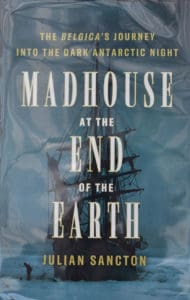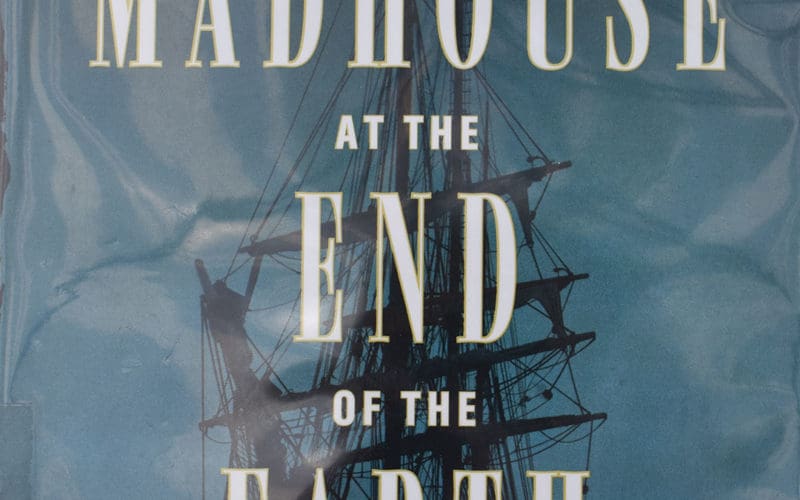Madhouse at the End of the Earth
by Julian Sancton
368 pp; $15.76
 If you’re a big fan of polar exploration and its pantheon of brave leaders –– Shackleton, Ross, Scott, Peary and Franklin –– you probably think you’ve read everything there is to know about these treacherous expeditions to unmapped regions. But you’d be wrong, because until now the story of the ill-fated Antarctic Belgica expedition has never been published in the English language.
If you’re a big fan of polar exploration and its pantheon of brave leaders –– Shackleton, Ross, Scott, Peary and Franklin –– you probably think you’ve read everything there is to know about these treacherous expeditions to unmapped regions. But you’d be wrong, because until now the story of the ill-fated Antarctic Belgica expedition has never been published in the English language.
This extraordinary story of man versus nature was first inspired by a casual reference to the expedition in a 2015 magazine article that Julian Sancton stumbled across. He did some research and was shocked that the tale had only been told in French. Thus began his own five-year odyssey to tell the story of Belgica.
Adrien de Gerlache, scion of Belgium’s oldest aristocratic family, had dreamt of exploring Antarctica his entire life. For three years he scrambled for financial backers, men and supplies, selling the adventure as a matter of national pride, asking potential donors, “why not Belgium?” Finally, he had his ship, a barque with a steam engine. His quest was to discover the location of the South Magnetic Pole and obtain unknown flora and fauna.
But almost from the start, the expedition was jinxed, suffering engine failure and crew desertions before they even left Europe. Voracious rats came aboard in Punta Arenas and feasted on the polar clothing. After a near mutiny and a hard grounding in Beagle Channel, it becomes clear to the reader that de Gerlache—like Columbus—was a sailor but not a leader.
To de Gerlache’s credit, he created the first international expedition, hiring people based on their skills and not their country of birth. He jumped at the opportunity to hire future exploration icons Frederick Cook and Roald Amundsen, whose combined ingenuity and leadership surely saved the Belgica’s crew when all appeared lost, and who would go on to lead polar expeditions of their own.
Entering the continent at Graham Land late in the austral summer, de Gerlache was faced with the humiliation of returning empty handed or forging on, surely to be frozen in for the winter. He chose the latter—without informing his crew—one of his many decisions that placed favorable newspaper headlines and the approval of sponsors ahead of the crew’s safety.
Not surprisingly, the crew was upset. And scared. No one had ever spent a winter below the Antarctic Circle, “marooned in a white Sahara.” De Gerlache had specifically told crewmembers that he would not do this, but by the time the ruse was discovered they were stuck for the winter, perhaps forever.
The repeated heartbreaks they experienced as they tried to blast, saw, shovel and ski their way out of the frozen prison, while suffering from scurvy, tasteless meals and mental illness makes for fascinating reading. I kept wondering, what else can go wrong for these guys? “Madhouse at the End of the Earth” is a testament to the perseverance of men in a desperate situation and will remind you of the maxim that sometimes it’s better to be lucky than smart.
Robert Beringer

